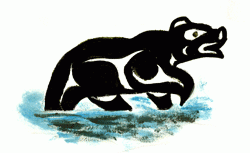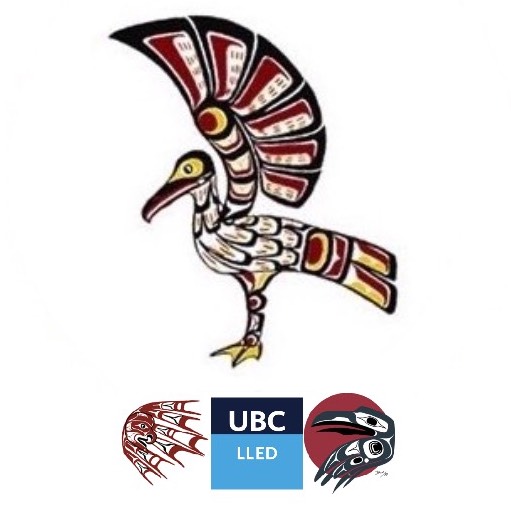Respected elders, chief and council, members of the school board: our traditional Nisga’a language
![]()
Respected elders, chief and council, members of the school board. I stand here today with mixed emotions. I stand here today, with a dream in my heart, a dream of a future where every person in our community will speak our traditional Nisga’a language. It hurts very much, to see our children wondering aimlessly. Our children are walking the streets of our community with nothing, they have no real true identity. Our children are at a time in their lives where they want to know who they are, where they come from, and what their role is in society. I stand here today on behalf of our children, for it is through them that our people will live on. I stand here, with a hope that you will see that what I’m asking for is of importance. I stand here with hope that you will join me in this great undertaking. As you may know, I just returned from three weeks of summer courses at the University of British Columbia. The courses that I completed have given me the tools to stand here and ask for your support, I need you support on all levels. I have noticed in the last ten to fifteen years our language has been slowly dwindling away. The only time we hear our language spoken is when we have our feasts. There are a number of us in the community that feel that this is not enough to sustain our language. We feel that our language needs a giant boost. Our children deserve to learn their language, they will be well off if they get their language now, while they’re still young. I know that some of our older generations have suffered because of our language, but the times have changed, it is now a good or cool thing to speak your own traditional language. Our younger generations are now realizing that their language is of importance to them. The time is now, the young people are asking for it. I’m here on their behalf, and we are here to ask for some financial help, moral support and our elders’ assistance, so that our children have the best teachers around on a daily basis.
First of all, in the summer courses, I had the chance to see how things work with regards to language basics. I have surveyed a number of my friends via the internet, the response the I’ve received is very promising. So on behalf of us, our children, and our nation, we ask for your support. Throughout the three weeks of courses, I have seen and heard about First Nations communities who have started a revitalization process. The outcomes of their work are very exciting. I have good reasons for being here today. When I was at this summer session, I went for walks in the early evenings, and what I seen was just so heart warming. I was walking around campus, came across a group of young children from Brazil, each of them speaking their own language. These children are very young, eleven to maybe fifteen years old. I was amazed to hear them speaking to each other. I want to see this in our own community. I want to be able to walk down the streets of our community and hear the children screaming at each other in our language. The time is now, our children want to learn.
Secondly, in the documentation and revitalization course this summer, we learned about how to transcribe the language, so we are prepared to put in all the time and effort to make this project work. The transcription is needed when we interview elders, or people who can speak the language fluently. In the course, we learned that we don’t have to teach grammar, sentence structure, or any of that stuff, right away. For that would only make things much more difficult for the students. We have learned that we have many resources right here within this meeting.
Our elders can offer their knowledge, many of you on the council, can assist by giving your time, and also supporting us at the higher levels of government. To you on the school board, you can assist by giving us your vote of confidence, and also assist in policy change on a few topics. This project will take time, money, and determination. I know that with team work we can do it. I always remember the Nisga’a saying, Sayt’ K’il’im G oot {Of One Heart} This is how we as Nisga’a have been able to overcome all that the world has thrown our way, we always work together, with one heart, one body, one mind. During the course, we read through a wide range of material, about languages, their loss, their revitalization, the immersion concept. All of which are great ways to re-awaken the language of our people. Some studies have shown that being bi-lingual, even multi-lingual, is good, and may enhance greater results from our children later in their academic endeavors. Our children will have an advantage in life, if they learn their language, their advantage will not only be here at home but out there in the world, if our children learn our language, their way of thinking will change. They will no longer think in the one mind set, they will have a broader sense of, not only who they are, where they come from, and their role in society, but of the world in general. Their outlook will be much different, because when they understand and speak our language, they will understand it in the terms that it is said, the words spoken to them will have a real, and true meaning. As you know when our language is spoken, there is much more meaning behind it, rather then hearing it in the English language, where you loose the meaning. Learning our language will not bring any bad to our children, it will only make them stronger.
Thirdly, The revitalization of our language will benefit every one of us, not only the children, and teenagers, many of our young parents, from thirty years and up do not speak the language as well, this project will be aimed at everyone and anyone that is interested. We will have an open door policy, we all know that life happens, so we will not structure the classes in the conventional school ways. Many of our people are still not comfortable with those ways. We will teach the children in a very structured fashion, however the adults and young teens will have time out on the land, and class out on the field, in the coffee shop, wherever they are comfortable. Curriculum is already being drafted, funding is been sought after, and our schedules have been drafted up. We are serious about this project, we are not doing this just for something to do, we do have families and responsibilities to take care of, however, we see our language as a number one priority, and are willing to put in all the blood, sweat, and maybe even tears to see this project through. Our children deserve the opportunity to be Nisga’a and we will not sit back and let them wonder aimlessly, with no identity. I have been to many feasts throughout my lifetime, and I have heard time and time again, that we must learn our language, for without our language, who are we, will we still be Nisga’a? This is one question that no one should have to ever attempt to answer. Language is culture, and culture is language, we cannot have one without the other. The balance that our forefathers once had, will be gone. We as Nisga’a people are sometimes looked upon as well off because of our treaty, when this is not the case, I recall during the final stages of the treaty process, the language came up in discussion, and suggestions were made that the final draft be available in the Nisga’a language, I know that- that was ridiculous because much of the terminology used in the document there are no words in our language to translate, anyway, the Nisga’a Language was made the official language of the nation, or territory and still it is not used in the offices, this project will change that. Research has also shown that, one cannot necessarily loose their language, I know that many of our people say they lost their language, I believe that it is sleeping in a certain part of the brain, and with a little practice, it will come back. Research has been done by many different organizations, and their, findings indicate that within th near future, fifty percent of the worlds seven thousand languages will be lost. Nisga’a will not be one of those that are lost. But we must start now, today, we don’t know what the future holds for our elders, so we must start now. We need to get as much of the valuable information that they hold.
In conclusion, the time’s have changed, people throughout the world are in a mode of revitalization. In many places, around the world, this is one major topic, and something that is being dealt with right now. We see this project as a very exciting and hopefully adventurous, also educational endeavor, we believe that this will give us back our community. Many, of our people are ready and willing to learn the language, so why should we deprive them of their inherent right to speak their own traditional language. Ladies and Gentlemen, we are here to make a very big decision, a decision that will shape our community for a very-very long time.
We are here to decide whether our people should learn our language, this is a decision that we should not take lightly, this is one that will go down in our history books, right along side the books of our treaty. So in closing, I urge you to take a bit of time, to think about whether the language is that important to you and your family. Also, think about the reasons that I have stated about why this process is a good thing, for all people involved. I thank you for your time, I hope to see you at our first meeting, which will be held on July 21,2006, an announcement will be made as to where it will be.
Take care my people, and please, think long and hard about this because, it is our future that we are talking about. Ty’oo k ‘siy’ nisim’ {Thank-You}

